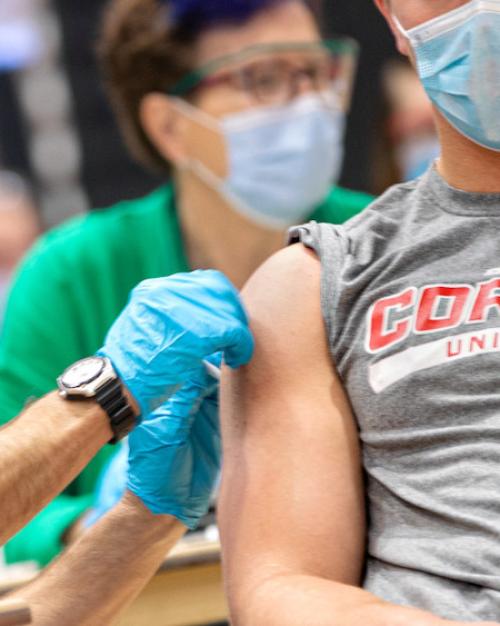Six Cornell faculty members from three different colleges will work together to improve epidemiological models of infectious disease, including by better incorporating human behavior into the models, using a $1 million grant from the National Science Foundation.
COVID-19 made clear the need for improved models. Organizations at all levels of society, from small businesses and schools to cities and countries, have been making decisions throughout the pandemic without a clear idea of exactly what factors they should be considering.
Cornell’s successful COVID-19 response was shaped largely by models created and updated by members of the School of Operations Research and Information Engineering (ORIE) under the leadership of Peter Frazier, the Eleanor and Howard Morgan Professor, with major contributions by David Shmoys, the Laibe/Acheson Professor of Business Management and Leadership Studies. Shane Henderson, the Charles W. Lake, Jr. Professor in ORIE, says that the effort to create these models was happening in real-time with huge consequences and under lots of pressure, and he is proud of what Cornell’s response team was able to do.
“But it wasn’t perfect,” Henderson said. “And now is the time to take stock and ask how we can improve these types of models so that we are better prepared for the next time.”
The grant proposal, called “Behavioral Heterogeneity and Uncertainty in Epidemiological Models,” was one of eight across the nation funded with the goal of infusing human behavior into epidemiological models.
When Henderson, Frazier and Shmoys saw the call for proposals they felt they were in a good position to be awarded one of the grants. They had been deeply involved in the creation of the COVID-19 models Cornell has been using for two years and they have access to the great breadth of expertise across the Cornell campus. They recruited Casey Cazer, assistant professor of population medicine and diagnostic sciences, and Gen Meredith, professor of practice in public and ecosystem health – both from the School of Veterinary Medicine – and Benjamin Cornwell, chair of the Department of Sociology in the College of Arts and Sciences, to join the team.
One goal of the group is to combine their knowledge of mathematical modeling, sociology, public health and infectious disease epidemiology to capture some of the unpredictability of human behavior and bake it into the models they create. Another aim of the researchers is to get the models into the hands of public health professionals and decision makers so that they can plan and implement evidence-informed policies.
Cornwell brings his knowledge of social networks and human behavior to the models.
“To understand the factors that drive transmission and risk, you have to understand networks,” Cornwell said. “We are going to integrate what we know about the number and types of daily contacts people are likely to have into our models so that we can get even better estimates of risk of epidemic spread than we already have.”
The researchers want to create models that will be of use beyond simply Cornell or college campuses in general, where in some ways, behaviors are more heterogeneous than community populations as a whole.
“In public health we talk about the importance of interdisciplinarity to approach problem-solving,” Meredith said. “It is gratifying to see the NSF recognize the value and potential of a team like this, and the research and reach this might have.”
As part of the grant, Meredith will be talking with public health leaders to better understand if and how they use epidemiological models to inform policies and actions, and how models could be better designed for access and use.
In addition, the project will produce educational materials and activities to expand health officials’ appreciation for what modeling can do, and be integrated into university course offerings and experiences for engineering and public health students.
“Our research team has considerable practical experience, having conducted extensive modeling to advise Cornell University leadership on essentially every major decision related to the COVID-19 pandemic since April of 2020,” Henderson said. “We have the skills to advance the field, and the contacts and credibility needed to generate real impact. We are very pleased and grateful that the NSF agrees.”





